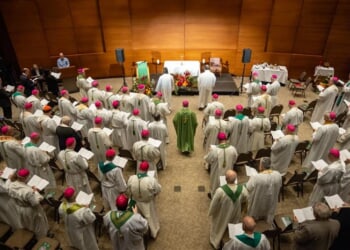The highly progressive left-wing dominance on most college campuses has turned off not only the Trump administration but large portions of the American public whose financial support is critical to higher education’s survival. Attempts to reform colleges from within have had limited success. (RELATED: Can Artificial Intelligence Reduce the Left-Wing Bias in University Classrooms?)
One such approach is to create new colleges, like the new University of Austin. But that takes enormous amounts of money — amidst a declining number of college-age individuals because of the birth dearth. Another approach is to have a collegiate civil war, toppling the institution’s governing board and firing overly woke administrators, which seemingly worked at New College in Florida, but not many other places. A third approach, creating traditional and more conservative-oriented civic centers within universities, has met some limited success, but they face continued resistance from the dominant campus power structure. (RELATED: From the Top Down: The Erosion of Faith at Georgetown University)
But there is an approach that would bring a fair amount of viewpoint diversity at a low cost and probably even often only modest objection from the campus leftish power structure: create a campus-wide debate series using primarily outside speakers. (RELATED: How the Classical Education Movement Is Rescuing a Lost Generation)
Let me give one possible model. Create an Athenian Dialogue: Debates on Critical Issues of the Day.
Let me give one possible model. Create an Athenian Dialogue: Debates on Critical Issues of the Day. Allocate $150,000 annually (barely the cost of one tenured professor) for a series of four debates, two each semester, with nationally recognized speakers. At each debate, a well-known conservative-libertarian would debate a nationally recognized liberal-progressive on a topic of current national interest, each paid honoraria averaging perhaps $10,000 or $15,000. The participants would typically formally debate for up to an hour, followed by another 30 minutes of questions. (RELATED: Higher Education’s Triple Crisis: Finances, Integrity, Leadership)
A baker’s dozen examples of debate topics: Should the U.S. have high tariffs to promote domestic industry? Should the U.S. restrict fossil fuel development on environmental and climate grounds? Should the U.S. Department of Education be eliminated? Should the U.S. have a balanced budget constitutional amendment that restricts federal deficit spending? Should young people be required to do at least one year of public service (military, Peace Corps, Teach for America, etc.)?
Should we allow large numbers of highly productive immigrants who are willing to buy an expensive visa to become American workers and ultimately citizens? Should federal health insurance be made available at low or no cost to all Americans, financed by higher income and wealth taxes on the affluent? Should the government fund gender-affirming surgery? Should we legalize the use of marijuana and cocaine, and lower the drinking age to 18?
Should primary and secondary students be given government-funded vouchers towards tuition at the school of their choice, even religiously affiliated ones? Should the United States leave NATO? Should the U.S. support Taiwan in the event of an invasion by China? Is the exclusion of consideration of race, gender, religion, and national origin appropriate in hiring, admissions, and contracting decisions?
At small liberal arts colleges, in-person student attendance at the debates could be made mandatory, sometimes using big buildings like basketball gymnasiums. At larger schools, students should be encouraged or enticed to attend, perhaps via computer. The Gates, Lumina, and Ford Foundations could finance the debates at 100 schools each for probably under $50 million total annually.
There are many possible variants on the idea. Have debates featuring local students and faculty. Copy the tradition of the Oxford Union, now in its third century. Mandate that all students participate in at least one debate as a graduation requirement. Have politically oriented student groups, such as the College Republicans or College Democrats, jointly organize debates. Follow the Open to Debate series moderated by John Donvan for tips. I have personally appeared in one such debate (under the previous name Intelligence Squared) at Lincoln Center, and at another at NYU, and found them both entertaining and informative.
To be sure, having a few debates a year on campus is typically not going to dramatically change the campus culture for most students. But it would increase, somewhat, academic viewpoint diversity at a reasonable cost and with minimal battles with the woke bureaucracy. Bringing in individuals of distinction from other locations reduces campus provinciality and sometimes offers students new perspectives on life on a smaller and less expensive scale than, for example, study abroad programs. Let’s give it a try.
READ MORE from Richard Vedder:
Concierge Service for Favored Universities?
Higher Education’s Triple Crisis: Finances, Integrity, Leadership
Why Are People Fleeing Highly Educated States?
Richard Vedder is a distinguished professor emeritus at Ohio University, senior fellow at both the Independent Institute and Unleash Prosperity, and author of Let Colleges Fail: The Power of Creative Destruction in Higher Education.







![Florida Man Arrested, Said He Had a 'Dirty Bomb' in His Truck [WATCH]](https://www.right2024.com/wp-content/uploads/2025/12/Florida-Man-Arrested-Said-He-Had-a-Dirty-Bomb-in-350x250.jpg)

![Florida Officer Shot Twice in the Face During Service Call; Suspect Killed [WATCH]](https://www.right2024.com/wp-content/uploads/2025/12/Inmate-Escapes-Atlanta-Hospital-After-Suicide-Attempt-Steals-SUV-Handgun-350x250.jpg)






